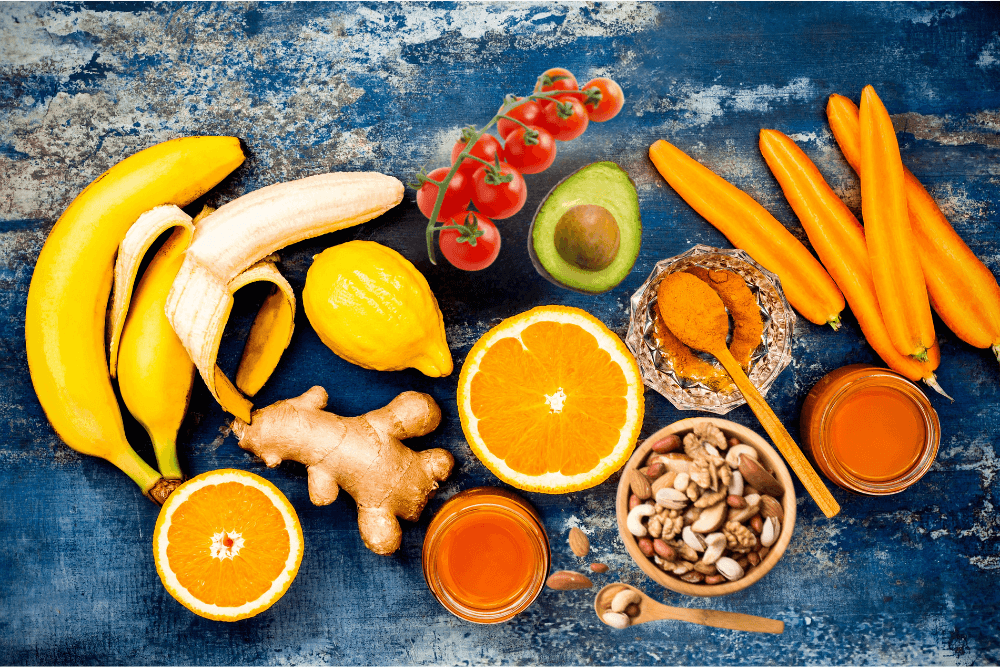Inflammation is the body’s natural response to injury, infection, or harmful stimuli. However, chronic inflammation is an ongoing state of inflammation that lasts for months or even years. It can be caused by a variety of factors, such as injuries, infections, autoimmune disorders, exposure to toxins in products and the air, poor diet, lack of exercise, and more. And today, chronic inflammation is a root cause of many of our most common diseases, including cardiovascular disease, diabetes, arthritis, and cancer.
The good news is that lifestyle choices in your control can have an immense impact on combatting chronic inflammation. And one of the most powerful steps you can take is eating the right foods.
Plant-based foods provide especially powerful anti-inflammatory properties, and below are ten of the best, according to recent research.
1. Turmeric
 Turmeric, often used in curries and traditional medicine, contains a potent compound known as curcumin. Curcumin has powerful anti-inflammatory and antioxidant properties, making it one of the most studied anti-inflammatory agents in the plant world.
Turmeric, often used in curries and traditional medicine, contains a potent compound known as curcumin. Curcumin has powerful anti-inflammatory and antioxidant properties, making it one of the most studied anti-inflammatory agents in the plant world.
Why It Works:
Curcumin blocks several molecules that play a key role in inflammation, such as NF-kB and COX-2. These molecules are involved in the inflammatory process and are implicated in diseases like arthritis, heart disease, and Alzheimer’s. Curcumin is also known to reduce oxidative stress, which exacerbates inflammation in the body.
Best Ways to Consume:
While using turmeric in cooking is healthy, to get effective amounts routinely, strongly consider an organic supplement that provides high-quality forms of turmeric. And note that turmeric has low “bioavailability” in the body. To maximize the absorption of curcumin, it should ideally be consumed with ginger, which is outstanding for increasing the bioavailability. Black pepper can also be used toward this end but be careful of excessive black pepper consumption if you have a sensitive stomach. Additionally, curcumin is fat-soluble, so pairing turmeric with healthy fats like avocado or coconut milk can further increase its bioavailability.
2. Ginger
 Ginger has long been used for its medicinal properties, particularly in treating inflammation and pain. The bioactive compounds in ginger, such as gingerol, are responsible for its anti-inflammatory effects.
Ginger has long been used for its medicinal properties, particularly in treating inflammation and pain. The bioactive compounds in ginger, such as gingerol, are responsible for its anti-inflammatory effects.
Why It Works:
Ginger contains several compounds that help reduce the levels of pro-inflammatory cytokines in the body. These cytokines are key players in the inflammatory process and are linked to various chronic diseases. Ginger also inhibits the activity of COX-2, an enzyme that promotes inflammation.
Best Ways to Consume:
As with turmeric, to get effective amounts routinely, strongly consider an organic supplement that provides you high-quality forms of ginger. In addition, fresh ginger can be added to smoothies, teas, or used in cooking. Dried ginger powder can be sprinkled on food or mixed into drinks.
3. Berries (Blueberries, Strawberries, Raspberries)
 Berries are rich in antioxidants, particularly flavonoids, which have been shown to have anti-inflammatory effects.
Berries are rich in antioxidants, particularly flavonoids, which have been shown to have anti-inflammatory effects.
Why They Work:
Berries, especially blueberries, contain anthocyanins, which are potent anti-inflammatory compounds. Studies show that anthocyanins help to suppress the activation of NF-kB, a major inflammatory pathway in the body. Additionally, berries help to reduce the levels of inflammatory markers such as CRP (C-reactive protein).
Best Ways to Consume:
Berries can be eaten fresh, added to smoothies, or mixed into oatmeal or salads. Frozen berries are also an excellent option, as they maintain most of their nutritional value. To get the most benefit, aim for a variety of berries to provide a wide range of antioxidants.
4. Leafy Greens (Spinach, Kale, Swiss Chard)
 Leafy greens are an essential part of any anti-inflammatory diet, rich in vitamins, minerals, and antioxidants.
Leafy greens are an essential part of any anti-inflammatory diet, rich in vitamins, minerals, and antioxidants.
Why They Work:
Leafy greens are packed with vitamin K, which has been shown to reduce inflammation by inhibiting the activity of pro-inflammatory enzymes. Additionally, they are high in antioxidants such as beta-carotene and vitamin C, which neutralize free radicals that contribute to inflammation.
Best Ways to Consume:
These greens are best consumed fresh, either raw in salads or lightly steamed or sautéed. Adding them to smoothies is another great way to ensure you’re getting enough of these powerful anti-inflammatory foods.
5. Cruciferous Vegetables (Broccoli, Cauliflower, Brussels Sprouts)
 Cruciferous vegetables like broccoli, cauliflower, and Brussels sprouts are known for their cancer-protective properties, but they also offer significant anti-inflammatory benefits.
Cruciferous vegetables like broccoli, cauliflower, and Brussels sprouts are known for their cancer-protective properties, but they also offer significant anti-inflammatory benefits.
Why They Work:
These vegetables are rich in sulforaphane, a compound that has been shown to block the production of pro-inflammatory molecules like TNF-alpha and IL-1β. Sulforaphane also activates Nrf2, a protein that plays a role in the body’s antioxidant response, further reducing inflammation.
Best Ways to Consume:
Cruciferous vegetables are best steamed or lightly cooked to preserve their sulforaphane content. Chopping them prior to cooking may increase their anti-inflammatory properties. Eating them raw in salads or as part of a vegetable platter is another option, though cooking slightly may enhance digestibility.
6. Chia Seeds
 Chia seeds are a nutrient-dense food that contains high amounts of omega-3 fatty acids, fiber, and antioxidants.
Chia seeds are a nutrient-dense food that contains high amounts of omega-3 fatty acids, fiber, and antioxidants.
Why They Work:
The omega-3 fatty acids in chia seeds, particularly alpha-linolenic acid (ALA), have been shown to reduce inflammation by lowering the levels of inflammatory markers like C-reactive protein (CRP). Omega-3s also help to reduce the production of pro-inflammatory cytokines in the body.
Best Ways to Consume:
Chia seeds can be added to smoothies, sprinkled on salads, or mixed into overnight oats or puddings. Soaking chia seeds in water or plant-based milk helps to make them easier to digest.
7. Tomatoes
 Tomatoes are a rich source of lycopene, a carotenoid that gives tomatoes their red color and has been shown to have strong anti-inflammatory properties.
Tomatoes are a rich source of lycopene, a carotenoid that gives tomatoes their red color and has been shown to have strong anti-inflammatory properties.
Why They Work:
Lycopene helps to reduce inflammation by inhibiting the activation of inflammatory pathways like NF-kB. Regular consumption of tomatoes has been linked to lower levels of inflammation markers such as C-reactive protein (CRP) and IL-6.
Best Ways to Consume:
The bioavailability of lycopene is enhanced when tomatoes are cooked, especially when paired with a small amount of fat (e.g., avocado or nuts). Thus, tomato sauces, soups, and stews are great options for maximizing the benefits of this powerful antioxidant.
8. Nuts (Almonds, Walnuts, Brazil Nuts)
 Nuts are an excellent source of healthy fats, fiber, and antioxidants, all of which can help reduce inflammation in the body.
Nuts are an excellent source of healthy fats, fiber, and antioxidants, all of which can help reduce inflammation in the body.
Why They Work:
The omega-3 fatty acids found in walnuts, along with the polyphenols in almonds and Brazil nuts, have potent anti-inflammatory effects. Walnuts, in particular, contain high levels of alpha-linolenic acid (ALA), which has been shown to reduce the expression of pro-inflammatory genes.
Best Ways to Consume:
Nuts can be eaten raw or roasted, but it’s best to avoid overly salted varieties. Raw nuts typically retain somewhat more of the nutrient value versus roasted. Add nuts to salads, smoothies, or eat them as a snack.
9. Avocado
 Avocado is a nutrient-dense fruit rich in healthy fats, fiber, vitamins, and minerals, including potassium and magnesium.
Avocado is a nutrient-dense fruit rich in healthy fats, fiber, vitamins, and minerals, including potassium and magnesium.
Why It Works:
Avocados contain monounsaturated fats that help reduce inflammation markers like CRP. They also contain antioxidants such as vitamin E, which has been shown to protect against oxidative stress and reduce inflammation.
Best Ways to Consume:
Avocado can be added to salads, mashed as a spread, or blended into smoothies. Eating it raw preserves the healthy fats and nutrients, but it can also be incorporated into various dishes.
10. Mushrooms (Shiitake, Maitake, Reishi)
 Mushrooms have been used for centuries for their medicinal properties, including their ability to reduce inflammation.
Mushrooms have been used for centuries for their medicinal properties, including their ability to reduce inflammation.
Why They Work:
Mushrooms, particularly shiitake, maitake, and reishi, contain compounds such as beta-glucans that enhance the immune system’s ability to reduce inflammation. They also contain antioxidants that help to reduce oxidative stress, further lowering inflammation.
Best Ways to Consume:
Mushrooms can be sautéed, roasted, or added to soups and stir-fries. Using dried mushrooms can also be beneficial, as they retain their medicinal compounds.
NEXT UP: Get Your Permanent Recordings & Transcripts of the Food Revolution Summit Docuseries FREE Today

If you appreciate these helpful insights about the most effective plant-based anti-inflammatory foods, you are going to LOVE the latest & greatest Food Revolution Summit Docuseries!
In it, world-renowned health leaders John and Ocean Robbins interview 45 of the planet’s top food experts, revealing the latest breakthroughs to best heal your body — with food!
And right now, you are getting immediate and permanent access to the complete recordings and written transcripts of the entire Food Revolution Summit Docuseries FREE when you order the recordings and written transcripts of the new Live Long & THRIVE Summit (which is available today with very special savings you won’t find elsewhere on our site before the price goes up!)
Head here now to see this & all 18 of the amazing gifts you are getting today (worth over $1500!)
The experts featured in the Food Revolution Summit Docuseries include Dean Ornish, MD… Neal Barnard, MD… Dean and Ayesha Sherzai, MD… Michael Klaper, MD… and more!
And, YES, you really will own the entire Food Revolution Summit Docuseries — all the recording and written transcripts, plus over $1000 of their additional gifts for you — as a free and immediate gift for you today…
When you order your new Live Long & THRIVE Summit recordings & written transcripts (which is available to you at by far our best price ever today!
PLUS, you are getting 17 more outstanding gifts in addition to the entire Food Revolution Summit Docuseries, so…
>>> Click here right now to find out more & order the Live Long & THRIVE recordings & transcripts today — do check out all 18 bonus gifts you get right away when you order, including the entire Food Revolution Summit Docuseries!
Sources:


